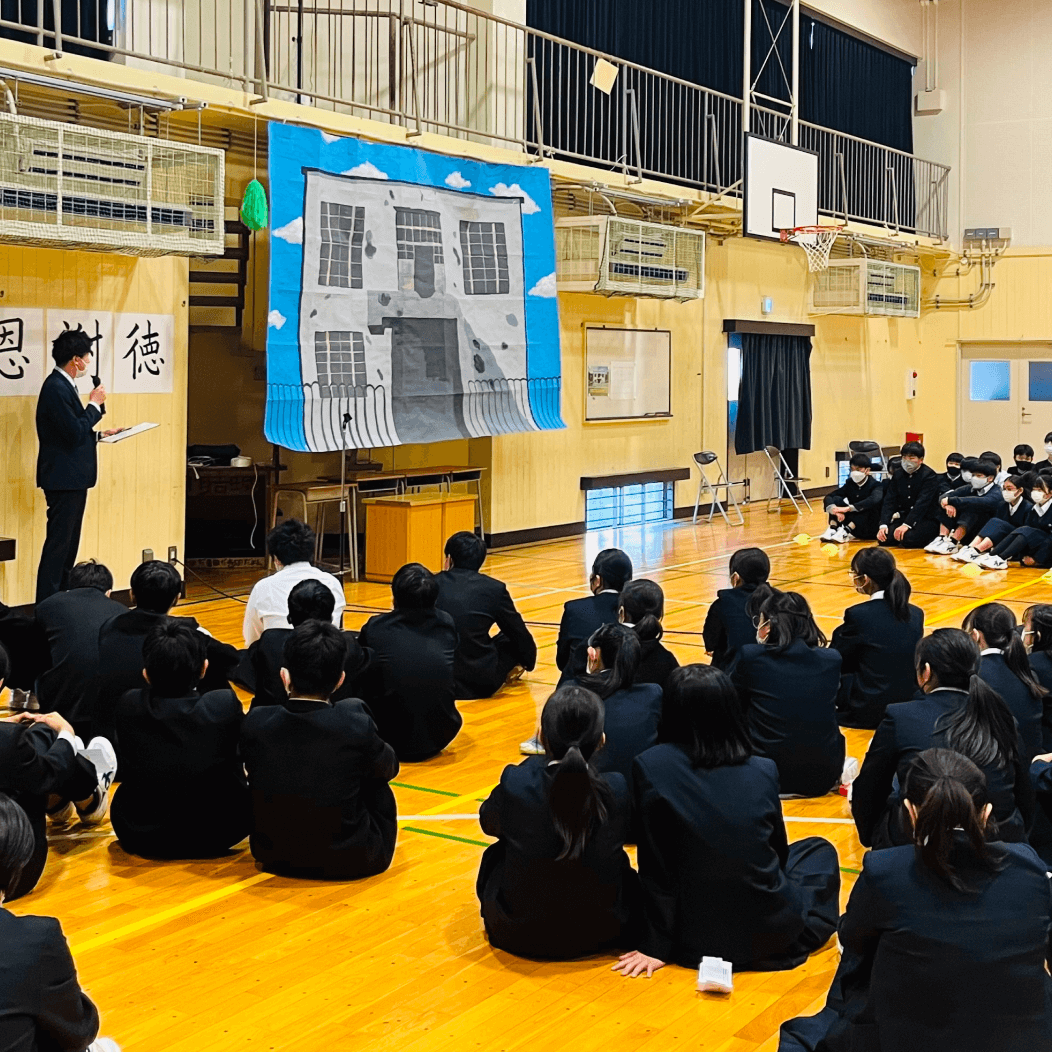
Partnerships
Collaboration with Civil Society
Win-Win Partnership through Co-creation

Partnerships
Collaboration with Civil Society
Win-Win Partnership through Co-creation
Citizen Participatory Cooperation
JICA conducts Citizen Participatory Cooperation activities to connect Japanese citizens aspiring to engage in international cooperation with developing countries. JICA’s major partners in these activities include NGOs, local governments, universities, and private companies in Japan. These activities are designed to help solve issues for local communities in Japan by leveraging JICA’s experience in international cooperation—in addition to addressing development issues for developing countries—through dialogue and collaboration with these partners. The idea is to contribute to the internationalization and economic revitalization of local communities in Japan.
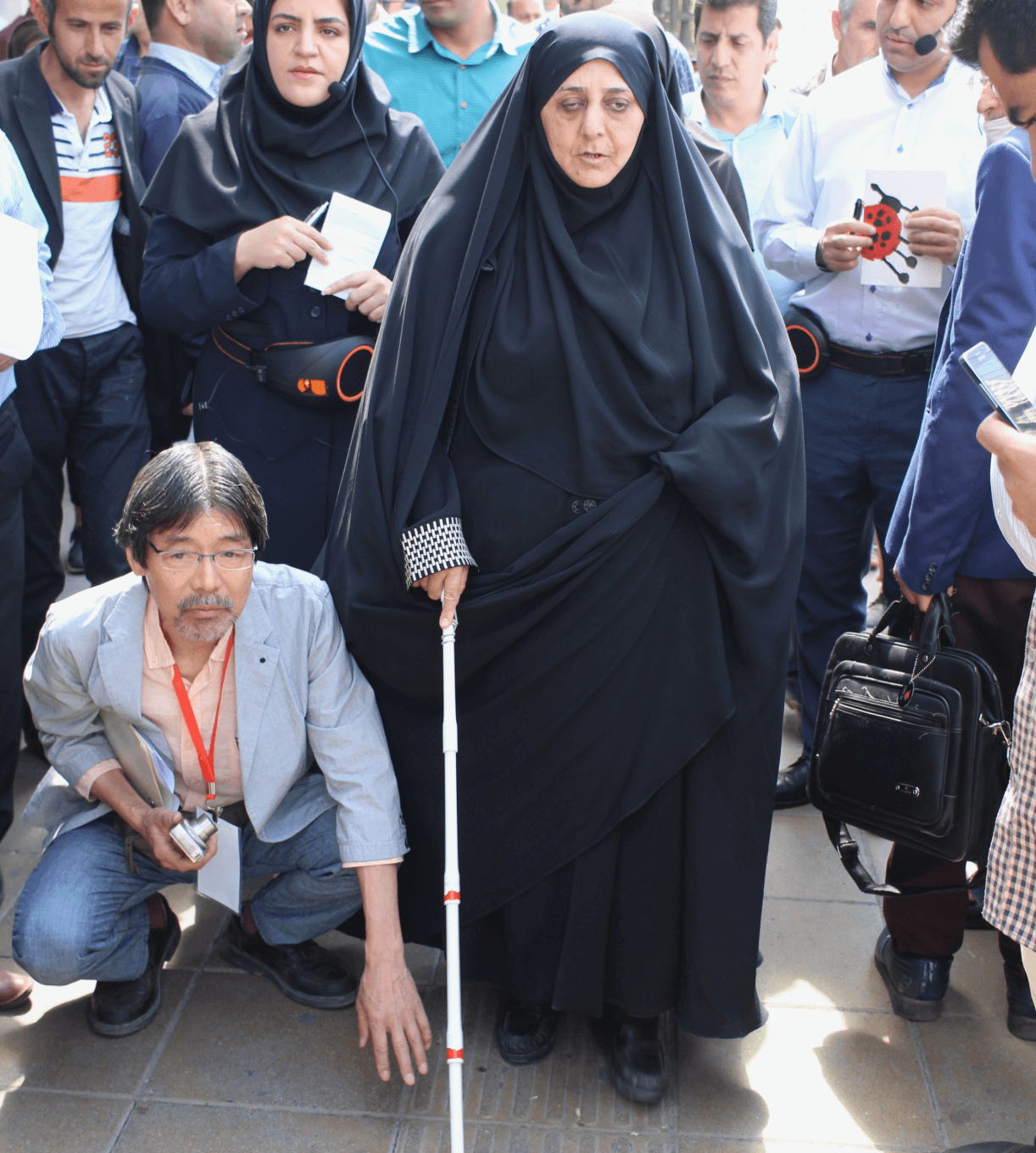
Iran: Aiming to promote barrier-free urban development in the country, the Mint Society for Iranians with Physical Handicaps, a Japan-based NPO, offers training in barrier-free urban development to Iranian government officials and also provides leadership training for Iranians with disabilities. Recently, the NPO produced and promoted an awareness-raising video regarding barrier-free facilities, with local leaders with disabilities in Iran playing a central role in the process. The NPO also helps make the sidewalks of busy streets barrier-free, adding to progress in accessibility in the country. (Photo: Mint Society for Iranians with Physical Handicaps)
Dialogue with NGOs and other organizations
JICA offers multiple opportunities for dialogue with partners. During fiscal 2022, the nationwide NGO-JICA Dialogue Meeting discussed, among other topics, efforts to increase the transparency of Japan’s ODA, accept foreign human resources, and build multicultural and inclusive society. At the regional level, several domestic offices of JICA, including JICA Yokohama and JICA Chubu, set up their own regional meetings to discuss community-based topics such as how to cultivate local young human resources. In addition, JICA holds NGO-JICA Study Sessions aimed at mutually learning about specific issues and at exploring more opportunities for cooperation. The topics during fiscal 2022 included the latest developments in support for Ukraine and protection from gender-based violence, sexual exploitation, abuse, and harassment.
JICA also operates the NGO-JICA Japan Desk in 27 developing countries to provide NGOs and other organizations based in Japan with information and seminars on their counterparts in these countries.
Collaboration projects: The JICA Donation Fund for the People of the World Program and JPP projects
As part of efforts to encourage NGOs and other organizations to participate in international cooperation, JICA conducts collaboration projects aimed at, among other objectives, improving the lives and livelihoods of local communities in developing countries. Collaboration projects that use the JICA Donation Fund for the People of the World—which is chiefly funded by donations to JICA—are primarily intended for organizations with little experience in international cooperation activity. Collaboration projects under the JICA Partnership Program (JPP), on the other hand, are primarily intended for NGOs, local governments, universities, and private companies that want to develop or expand their international cooperation activity.
Under JPP, JICA offers attentive cooperation at the grassroots level to meet diversifying issues and needs in developing countries. A JPP project in Indonesia, for example, opened a roadside station to promote agritourism, adding a new sales channel for local agricultural produce. The new station came with an adjacent evacuation shelter equipped with a water tank and an emergency power source, contributing to local disaster resilience.
JICA also provides NGOs and other organizations with training in project management and institutional capacity-building to enable them to successfully carry out such collaboration projects.
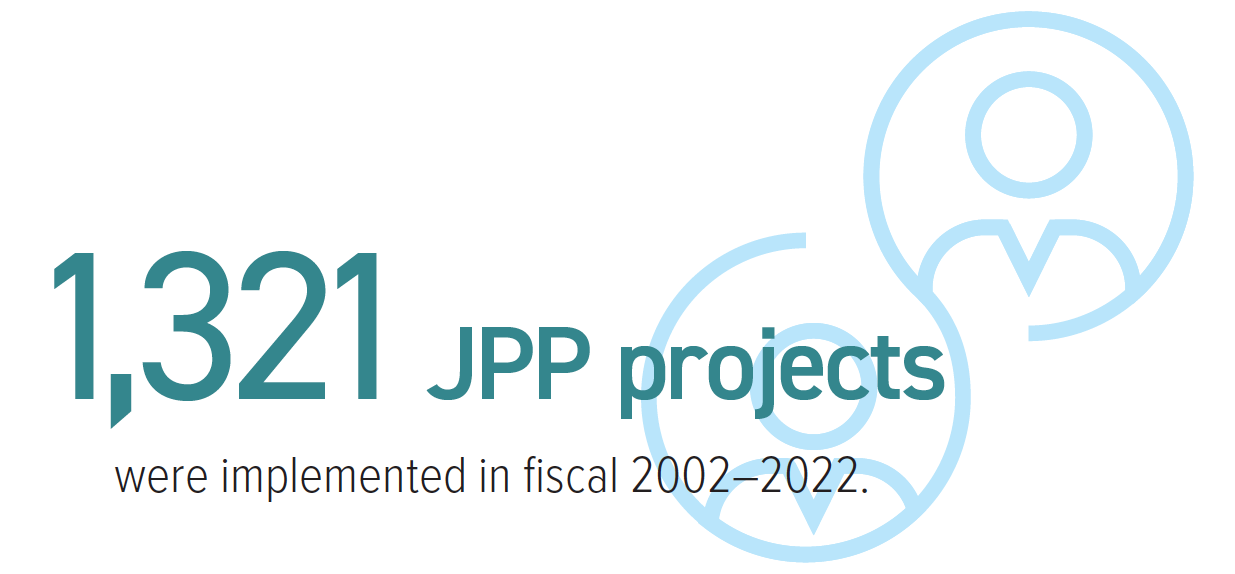
Supporting internationalization and community revitalization in Japan
JICA also leverages its experience in addressing development issues in developing countries to support internationalization and community revitalization efforts in Japan. JICA’s collaboration projects with local governments in Japan have not been limited only to leveraging their expertise and experience in such sectors as water, disaster resilience, and community development to address issues in developing countries. They have often involved mutual learning experiences that have benefited Japanese local governments as well. Through interaction with training participants from developing countries, some local governments have rediscovered the attractions and strengths of their communities while others are revitalizing their own communities or promoting local business interactions.
JICA also cooperates with local communities in conducting international cooperation activities and developing global human resources through the coordinators for international cooperation that JICA assigns to local international associations and other organizations across the country. JICA’s collaboration with local governments also takes the form of lending its employees. These employees cooperate in regional revitalization, disaster risk reduction, and post-disaster reconstruction. Recently, local governments and other regional actors are making more use of JICA’s know-how and networks in supporting coexistence with foreign nationals, promoting the SDGs, and developing international strategies.
Development Education
JICA Global Plaza
JICA’s three Global Plazas—the JICA Global Plaza in Ichigaya, Tokyo; the Nagoya Global Plaza in Nagoya City, Aichi; and the Hokkaido Global Plaza in Sapporo City, Hokkaido—offer hands-on exhibitions that encourage seeing, listening, and touching. Visitors can listen to Global Concierges, who have abundant experience in international cooperation. These Global Plazas offer the opportunity to learn about the realities in developing countries and the challenges facing the global community as well as international development cooperation at work, while encouraging visitors to think about what they learned and even translate it into action. Other JICA domestic offices also provide a wide range of information on international cooperation for the public.
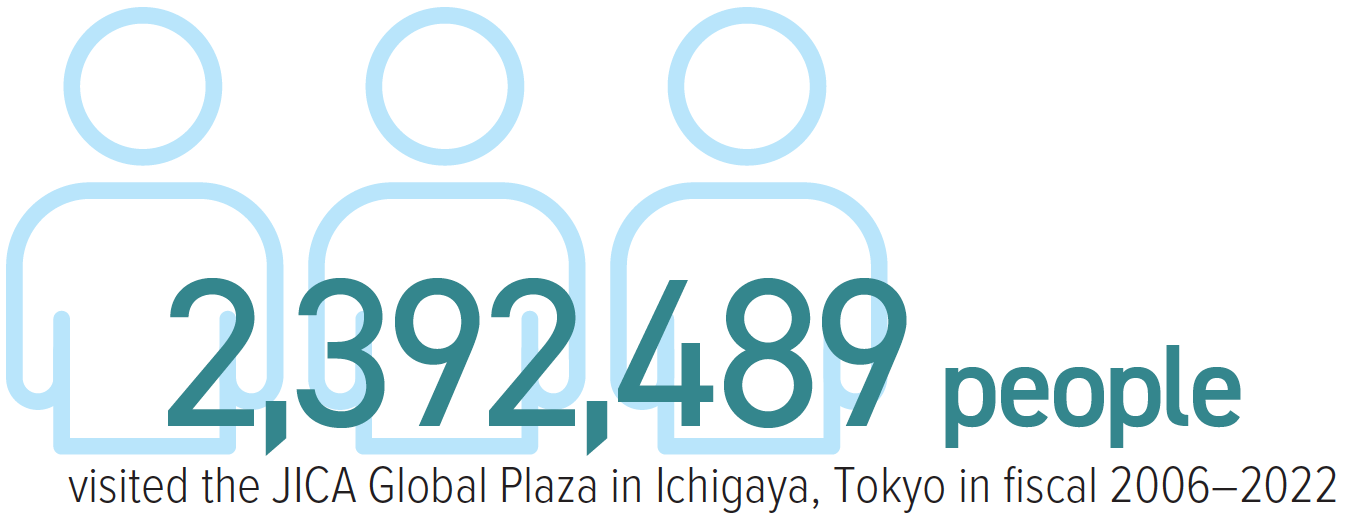
Promotion of development education at schools
JICA conducts activities aimed at promoting development education in schools. The idea is to foster the abilities of students and pupils to understand how development challenges facing the world relate to Japan; regard them as their own problems; proactively study them; and take action to overcome them. Specific activities include working with such actors as boards of education, teachers, and school administrators to organize training sessions and seminars for teachers; produce and provide teaching materials; hold an essay contest on international cooperation; and deliver lectures on international cooperation upon request.
JICA, with its ample expertise, information, and human resources in international cooperation, has an ever increasingly larger role to play in school education in the effort to foster creators of a sustainable society as called for in the New National Curriculum Standards, which came into effect in fiscal 2020.
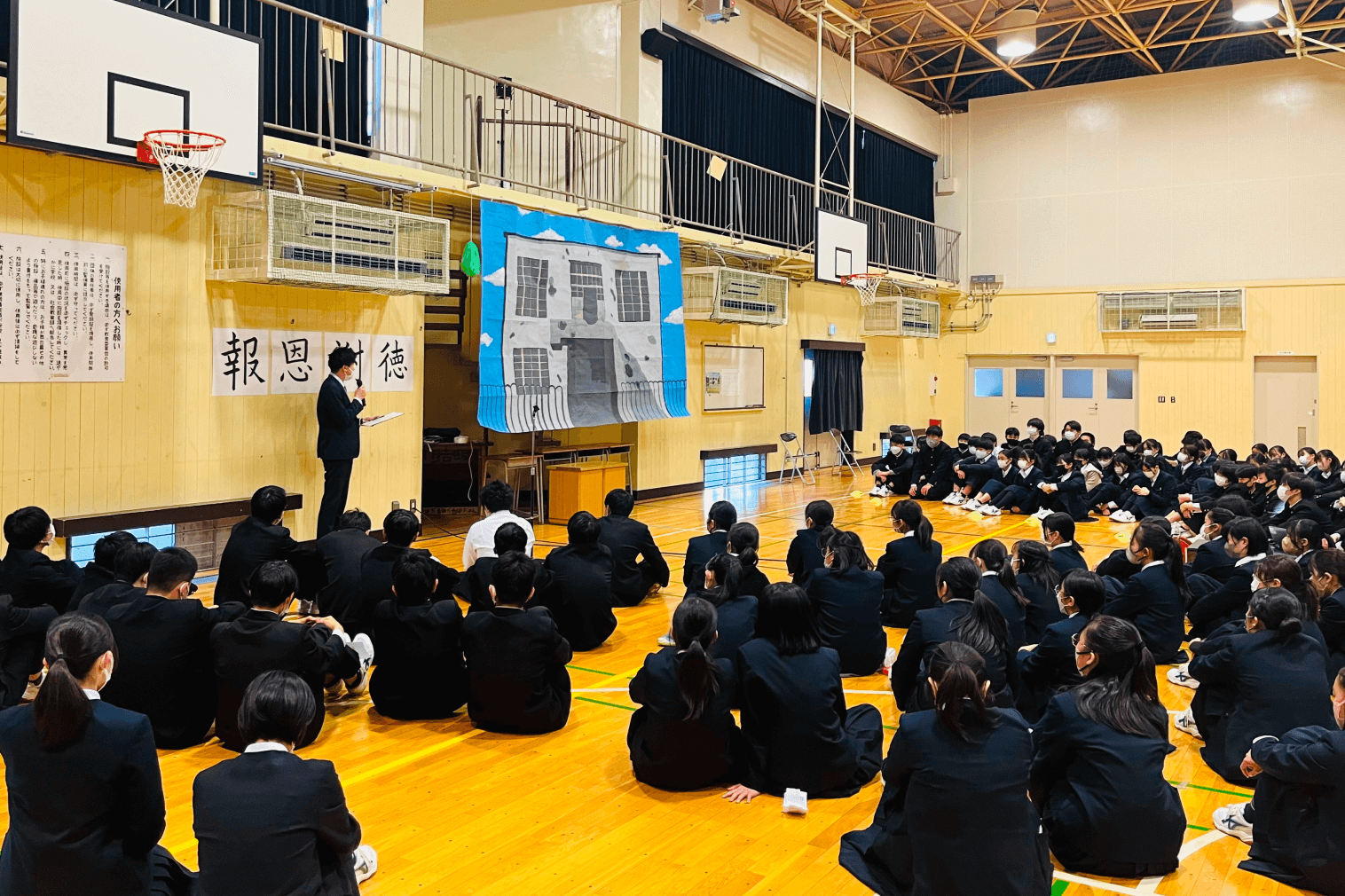
A former JICA volunteer recently gave a special class on peace at a junior high school in Tokyo where he teaches. He encouraged students to use their projection-mapping videos that feature a preserved wardamaged structure in their community to express their desire for peace to local residents. The photo shows the students receiving comments after the class in the presence of these residents. One of the students later wrote an essay on their learnings from this class and won the most outstanding prize in an essay contest organized by JICA. (Photo: Hiroyuki Takada, Higashiyamato Second Junior High School)
Leveraging JICA volunteers’ experience for education at schools
JICA supports the efforts of former JICA volunteers to give back their volunteer experience to society. In fact, their acquired skills in problem-solving and cross-cultural communication have already been put to good use in school education, entrepreneurship, and local social activity. For example, hundreds of teachers who have participated in the volunteer program are now giving classes in ways to educate students so that they think of global issues as their own and take action to address them.

